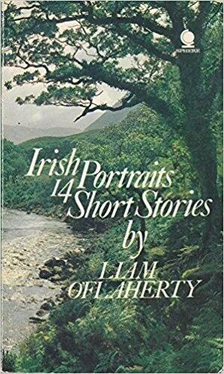At last the peasants got mad with him and said that if he didn’t let them treat the cow in the proper manner they would flay him within an inch of his life. “What good can you do her, you scoundrels?” yelled the schoomaster. “Give her whiskey,” roared the peasants. The schoolmaster was terrified out of his wits and told them to go and get whiskey. A lad brought a pint. They seized the cow and poured it down her throat. Soon she began to toss her head and run about breaking wind. That evening she was as well as ever.
But the schoolmaster sold her ard the calf a month later to Mick Grealish the blacksmith. Since then he never talks of cattle or farming. Neither does he give anybody advice. But the peasants have nicknamed him “The Bladder.”
There was a dark rim round the white disc of the sun. The sky was white, covered with a pale gauze. The sea was white, reflecting the colour of the sky. It was very hot and perfectly still.
The white water of the bay was spotless, except for a round black dot formed by a row-boat. The round, black row-boat lay still, casting no shadow. Not a bird. Not a ripple broke on the low shores, girdled with yellow sand and with grey-black rocks that looked sallow in all this whiteness. Beyond the shore the torrid earth was still, a silent mass of black earth covered with faded, yellow grass, grey rocks, grey stone fences, gleaming granite boulders strewn sparsely, white in the sun.
The tiny fishing-town of Bailenaleice lay in the angle of the bay, facing the bay with its back to the sun. Its hundred houses were scattered round the little square that ended at the pier. To the left of the pier there were a number of fishing hookers, moored side by side, high and dry, with sea grime on their black dry sides.
Ech! The little town was very idle. There had been no fish for a month. What weather!
It was just on the stroke of noon. A small crowd was loafing round the monument, watching the row-boat in silence. They were all drowsy with the heat and their enforced idleness. Here in the square they were at peace, away from their wives who nagged them for their idleness. At a distance, here and there, drowsy voices could be heard, talking aimlessly. Stray dogs rambled about, gambolling in a subdued manner.
There was absolutely no sign of life in the town. The courthouse, the post office, the police barracks, the tiny rail-head where a solitary goods waggon was perched on an eminence like a derelict, the drapery shop, the parochial house, where the priest was sitting in his library with his feet on a table reading G. B. Shaw’s plays, were all closed, silent and weatherbeaten. In the square itself, the door of the yellow-painted Grand Hotel was closed, and the proprietress, Mrs. Timoney, was leaning on her bare fat elbows at the window of an upper room. The only open door was that of the public-house and grocery shop owned by Mr. Mullally. In the open doorway, Mr. Mullally was sitting on the stone threshold, with his blue waistcoat open on his rotund stomach, half asleep.
Suddenly an enormous man marched down the town towards the pier, striking the earth fiercely with his heavy boots and swinging his arms in an exaggerated manner. The loafers round the monument jerked their heads around to look at him. Mr. Mullally also tried to turn his head, but his neck was so fat that he could not do so. He grunted and dropped his chin once more. The enormous man approached, shouting as he did so.
“Now ye divil ye,” whispered one of the loafers in a tired voice, “what ails the fellah?”
The man who approached was Bartly Tight, a farmer. He was dressed in grey frieze from head to foot. His limbs were enormous, but in spite of their size his coat and trousers were too large for him. His coat hung loose about his body and reached down his thighs. His trousers were wide and doubled up two or three times at the bottoms. He wore a very small grey cap at the top of his skull. His head was large, square and beautifully shaped. His complexion was tanned dark brown, so that he was almost the same colour as the grey land about him. A wonderfully handsome giant; so handsome that all the women in the little town and in the surrounding districts were madly in love with him.
But Bartly Tight was a fanatic and paid no heed to women. He was a socialist. He had lately returned to the district from America, after his father’s death. Since then he had been trying to convert the inhabitants to the socialist religion.
“Hey!” he cried, when he reached the square and caught sight of the loafers. “Here’s a damn’ story for you fellahs. Call yourselves Christians, do ye? Why, I’m the only damn’ Christian in this blasted town, and I’m an atheist. Search me, fellahs, there’s a lot o’ bums in this town. Yeh. Know what I’m goin’ to tell ye? Ye go to Mass every Sunday an’ then rob one another for the rest o’ the week.”
“Tell them the old, old story,” cried a loafer, in a singsong voice, imitating a street preacher.
The others laughed in low voices. Mullally suddenly woke up and he began to giggle. He was so fat and good-natured that he shook all over when he giggled. His little humorous eyes were almost completely hidden behind the layers of flesh on his cheeks. It was very good to look at him laughing. He made no sound. And his great mass of jet black hair shook when he laughed. Tight saw him laughing. He clenched his fist and menaced Mullally with it.
“Yeh,” he cried. “You can laugh, Mr. Mullally, But you can’t put anything over on me. I got your number.”
“Hey, Bartly,” cried a lean man, with a black wart on his face, “what did ye swally for breakfast that’s gone agin yer breath?”
There was another laugh. Bartly looked at the lean man angrily.
The lean man stared very solemnly at Bartly. The tail of his ragged black coat was immersed in the water of the horse trough, on the edge of which he was sitting. Somebody had told him about it an hour before, but he was too lazy to remove it.
“Yeh!” said Bartly to the lean man. “You’re a helluva wit, aren’t ye, Micky Degatty. But yer house needs a roof an’ ye haven’t done a stroke o’ work for a year, an’ yer wife is-”
“Aw! What odds, Bartly?” yawned Micky Degatty. “Won’t we be all dead some day?”
“You put yer finger on the trigger that time all right,” said a dapper little man with a pointed beard, who was leaning his buttocks on a stick. “Yes. Heh. There’s a long rest in the grave for us so we … heh … we might as well get used to resting. Eh?”
“That be damned,” said Bartly Tight, stamping on the road. “It’s idleness is … but that’s another story. What I want to know is this. Who knocked the gap in the wall o’ my clover field? There’s been two donkeys feedin’ there all night. ’Twas done deliberate. Who done it?”
“Ha!” said somebody. “That was a dirty trick.”
“Aw! Begob! A clover field. Was it the red meadow?”
“Ate to the ground,” bellowed Bartly Tight. “There’s Christians for ye. It’s not an accident. It’s an old gag in this town. Takin’ their cattle around in the middle o’ the night to feed on their neighbour’s land. What? Christians!”
He spat with great vehemence. Everybody began to discuss the matter with some heat, deprecating the conduct of the culprit, or culprits, whoever he or they were. But they soon tired of their interest. The day was too hot.
“Well,” said an old man at last. “It’s ate now anyway. What’s the use talkin’ about it? That won’t make the grass grow again.”
“There ye are again!” cried Tight, waving his arms. “What’s the use? What’s the use? That’s all ye can say. Let everything go slide. Idleness, ignorance, immorality. That’s what lets ye be a prey to the whole gang of idle parasites is drinkin’ yer body’s blood. Priests, gombeen men, shopkeepers, police, lawyers. Yah. Why the hell don’t ye wake up and take some interest in social affairs?”
Читать дальше












